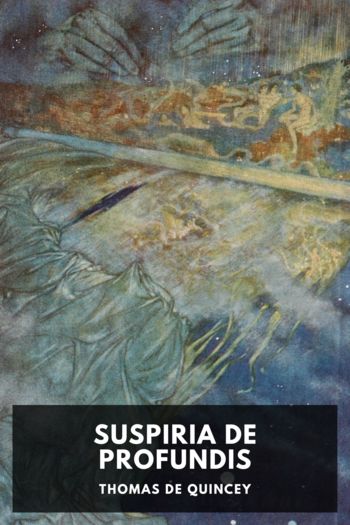Suspiria de Profundis by Thomas De Quincey (urban books to read .TXT) 📕

- Author: Thomas De Quincey
Book online «Suspiria de Profundis by Thomas De Quincey (urban books to read .TXT) 📕». Author Thomas De Quincey
I apprehend that, in a situation such as this, supposing it a real one, the lady-abbess would not start, would not show any marks externally of consternation or horror. The case was beyond that. The sentiment which attends the sudden revelation that all is lost silently is gathered up into the heart; it is too deep for gestures or for words; and no part of it passes to the outside. Were the ruin conditional, or were it in any point doubtful, it would be natural to utter ejaculations, and to seek sympathy. But, where the ruin is understood to be absolute, where sympathy cannot be consolation, and counsel cannot be hope, this is otherwise. The voice perishes; the gestures are frozen; and the spirit of man flies back upon its own centre. I, at least, upon seeing those awful gates closed and hung with draperies of woe, as for a death already past, spoke not, nor started, nor groaned. One profound sigh ascended from my heart, and I was silent for days.
In the Opium Confessions I touched a little upon the extraordinary power connected with opium (after long use) of amplifying the dimensions of time. Space, also, it amplifies by degrees that are sometimes terrific. But time it is upon which the exalting and multiplying power of opium chiefly spends its operation. Time becomes infinitely elastic, stretching out to such immeasurable and vanishing termini that it seems ridiculous to compute the sense of it, on waking, by expressions commensurate to human life. As in starry fields one computes by diameters of the Earth’s orbit, or of Jupiter’s, so, in valuing the virtual time lived during some dreams, the measurement by generations is ridiculous—by millennia is ridiculous; by aeons, I should say, if aeons were more determinate, would be also ridiculous.
Here pause, reader! Imagine yourself seated in some cloud-scaling swing, oscillating under the impulse of lunatic hands; for the strength of lunacy may belong to human dreams, the fearful caprice of lunacy, and the malice of lunacy, whilst the victim of those dreams may be all the more certainly removed from lunacy; even as a bridge gathers cohesion and strength from the increasing resistance into which it is forced by increasing pressure. Seated in such a swing, fast as you reach the lowest point of depression, may you rely on racing up to a starry altitude of corresponding ascent. Ups and downs you will see, heights and depths, in our fiery course together, such as will sometimes tempt you to look shyly and suspiciously at me, your guide, and the ruler of the oscillations. Here, at the point where I have called a halt, the reader has reached the lowest depths in my nursery afflictions. From that point, according to the principles of art which govern the movement of these Confessions, I had meant to launch him upwards through the whole arch of ascending visions which seemed requisite to balance the sweep downwards, so recently described in his course. But accidents of the press have made it impossible to accomplish this purpose. There is reason to regret that the advantages of position, which were essential to the full effect of passages planned for the equipoise and mutual resistance, have thus been lost. Meantime, upon the principle of the mariner, who rigs a jury-mast in default of his regular spars, I find my resource in a sort of “jury” peroration, not sufficient in the way of a balance by its proportions, but sufficient to indicate the quality of the balance which I had contemplated. He who has really read the preceding parts of these present Confessions will be aware that a stricter scrutiny of the past, such as was natural after the whole economy of the dreaming faculty had been convulsed beyond all precedents on record, led me to the conviction that not one agency, but two agencies, had cooperated to the tremendous result. The nursery experience had been the ally and the natural coefficient of the opium. For that reason it was that the nursery experience has been narrated. Logically it bears the very same relation to the convulsions of the dreaming faculty as the opium. The idealising tendency existed in the dream-theatre of my childhood; but the preternatural strength of its action and colouring was first developed after the confluence of the two causes. The reader must suppose me at Oxford; twelve years and a half are gone by; I am in the glory of youthful happiness: but I have now first tampered with opium; and now first the agitations of my childhood reopened





Comments (0)